Unit3 Could you please clean your room? 单元综合复习课件(含25张PPT)
文档属性
| 名称 | Unit3 Could you please clean your room? 单元综合复习课件(含25张PPT) |  | |
| 格式 | zip | ||
| 文件大小 | 947.7KB | ||
| 资源类型 | 试卷 | ||
| 版本资源 | 人教新目标(Go for it)版 | ||
| 科目 | 英语 | ||
| 更新时间 | 2023-03-07 09:45:24 | ||
图片预览

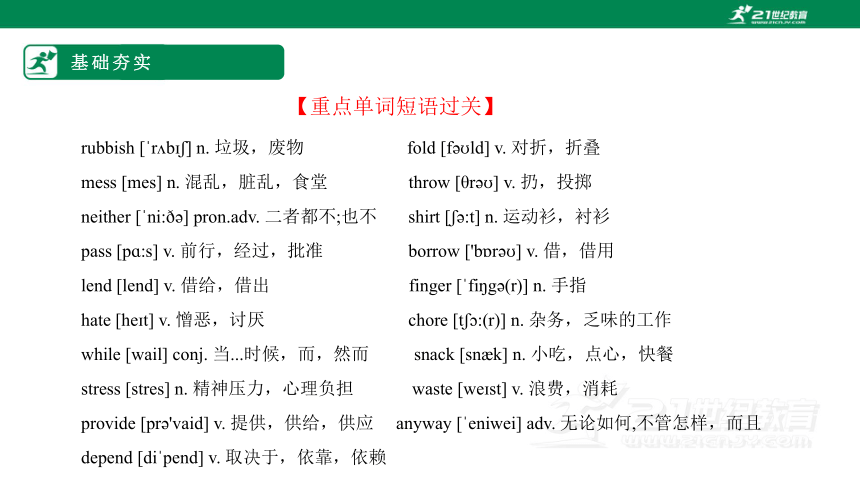
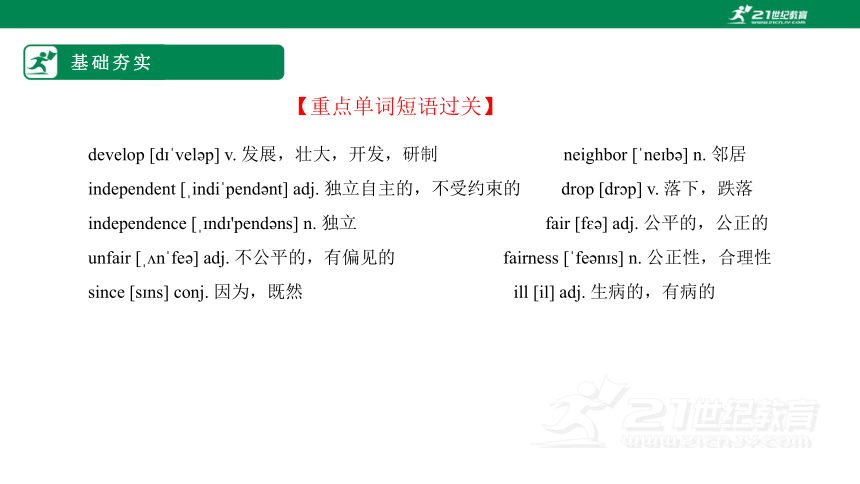
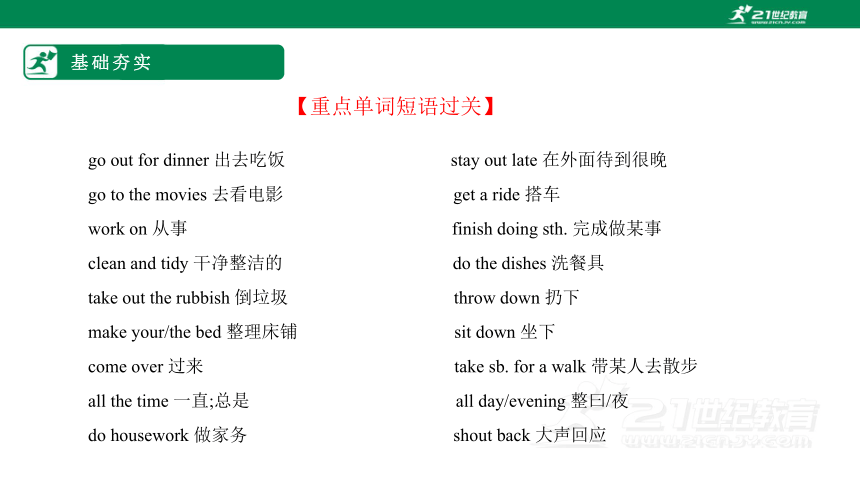
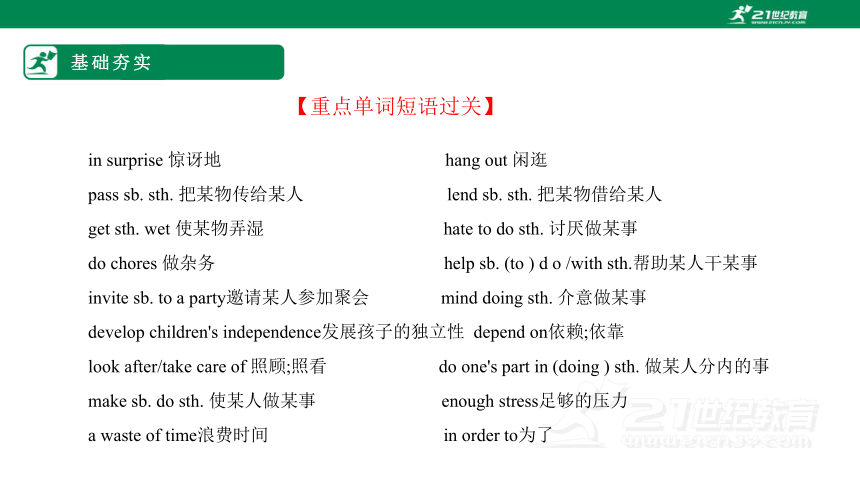
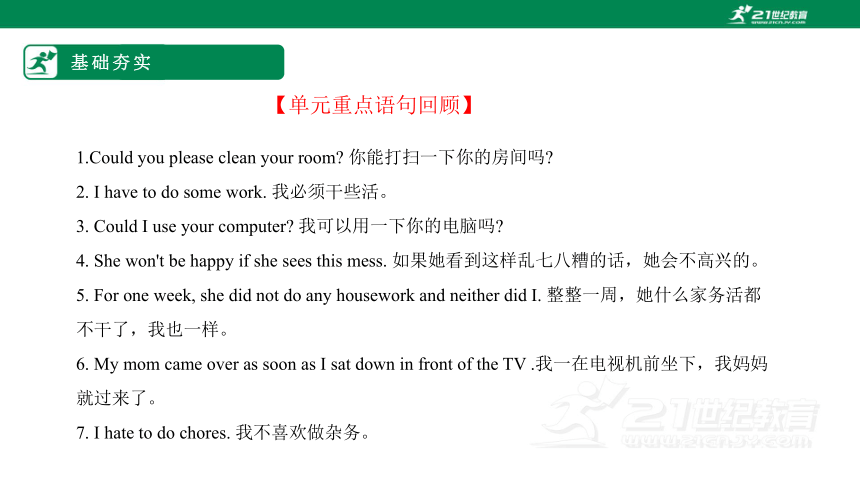
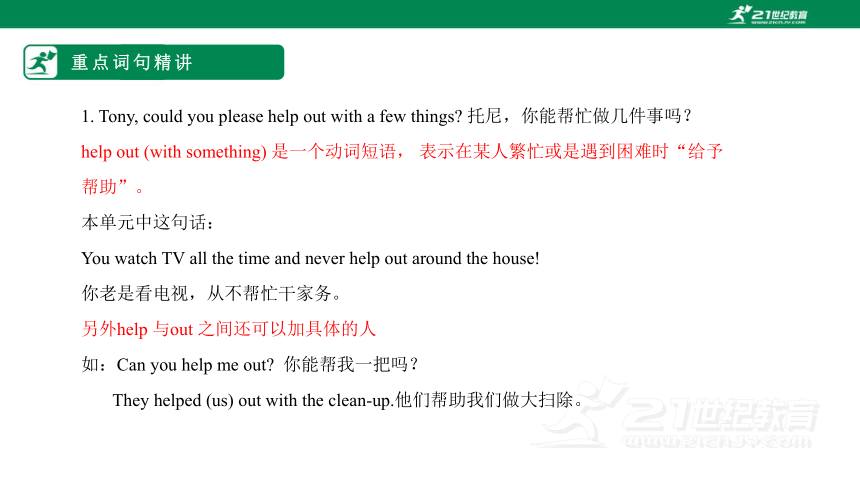
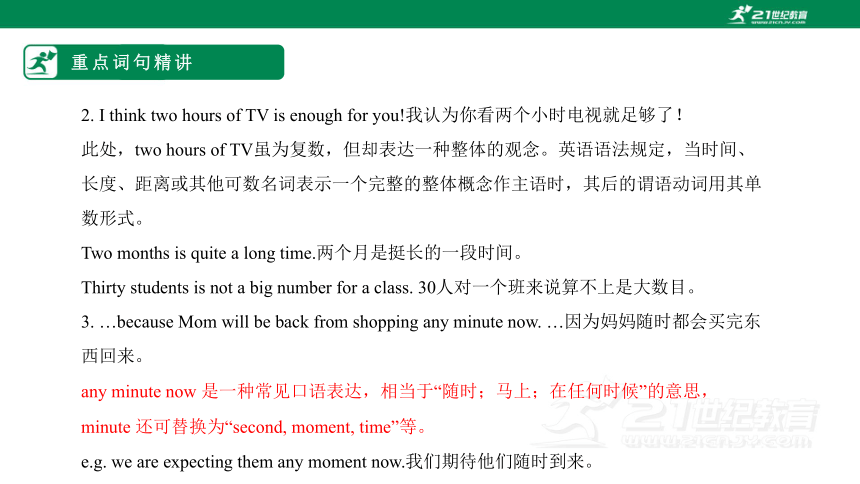
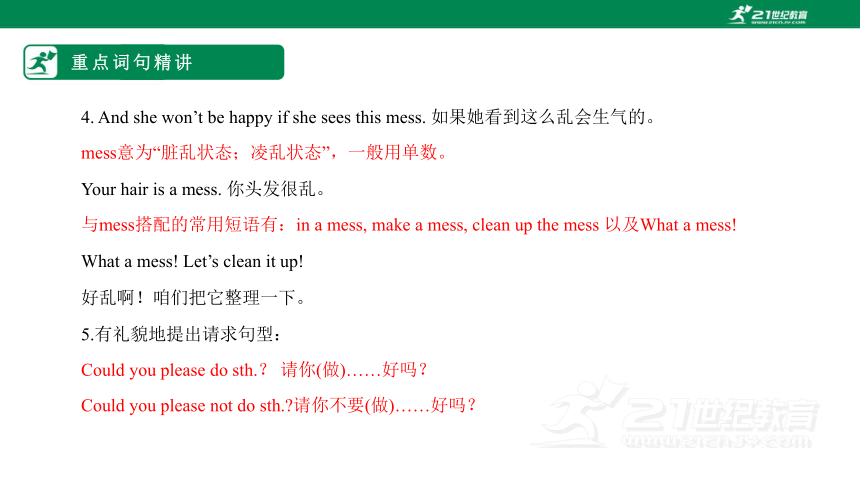
文档简介
(共25张PPT)
Unit3 单元综合复习
人教版英语八年级下册
基础夯实
rubbish [ r b ] n. 垃圾,废物 fold [f ld] v. 对折,折叠
mess [mes] n. 混乱,脏乱,食堂 throw [θr ] v. 扔,投掷
neither [ ni: ] pron.adv. 二者都不;也不 shirt [ :t] n. 运动衫,衬衫
pass [pɑ:s] v. 前行,经过,批准 borrow ['b r ] v. 借,借用
lend [lend] v. 借给,借出 finger [ fi g (r)] n. 手指
hate [he t] v. 憎恶,讨厌 chore [t :(r)] n. 杂务,乏味的工作
while [wail] conj. 当...时候,而,然而 snack [sn k] n. 小吃,点心,快餐
stress [stres] n. 精神压力,心理负担 waste [we st] v. 浪费,消耗
provide [pr 'vaid] v. 提供,供给,供应 anyway [ eniwei] adv. 无论如何,不管怎样,而且
depend [di pend] v. 取决于,依靠,依赖
【重点单词短语过关】
基础夯实
develop [d vel p] v. 发展,壮大,开发,研制 neighbor [ ne b ] n. 邻居
independent [ indi pend nt] adj. 独立自主的,不受约束的 drop [dr p] v. 落下,跌落
independence [ nd 'pend ns] n. 独立 fair [f ] adj. 公平的,公正的
unfair [ n fe ] adj. 不公平的,有偏见的 fairness [ fe n s] n. 公正性,合理性
since [s ns] conj. 因为,既然 ill [il] adj. 生病的,有病的
【重点单词短语过关】
基础夯实
go out for dinner 出去吃饭 stay out late 在外面待到很晚
go to the movies 去看电影 get a ride 搭车
work on 从事 finish doing sth. 完成做某事
clean and tidy 干净整洁的 do the dishes 洗餐具
take out the rubbish 倒垃圾 throw down 扔下
make your/the bed 整理床铺 sit down 坐下
come over 过来 take sb. for a walk 带某人去散步
all the time 一直;总是 all day/evening 整曰/夜
do housework 做家务 shout back 大声回应
【重点单词短语过关】
基础夯实
in surprise 惊讶地 hang out 闲逛
pass sb. sth. 把某物传给某人 lend sb. sth. 把某物借给某人
get sth. wet 使某物弄湿 hate to do sth. 讨厌做某事
do chores 做杂务 help sb. (to ) d o /with sth.帮助某人干某事
invite sb. to a party邀请某人参加聚会 mind doing sth. 介意做某事
develop children's independence发展孩子的独立性 depend on依赖;依靠
look after/take care of 照顾;照看 do one's part in (doing ) sth. 做某人分内的事
make sb. do sth. 使某人做某事 enough stress足够的压力
a waste of time浪费时间 in order to为了
【重点单词短语过关】
基础夯实
1.Could you please clean your room 你能打扫一下你的房间吗
2. I have to do some work. 我必须干些活。
3. Could I use your computer 我可以用一下你的电脑吗
4. She won't be happy if she sees this mess. 如果她看到这样乱七八糟的话,她会不高兴的。
5. For one week, she did not do any housework and neither did I. 整整一周,她什么家务活都不干了,我也一样。
6. My mom came over as soon as I sat down in front of the TV .我一在电视机前坐下,我妈妈就过来了。
7. I hate to do chores. 我不喜欢做杂务。
【单元重点语句回顾】
重点词句精讲
1. Tony, could you please help out with a few things 托尼,你能帮忙做几件事吗?
help out (with something) 是一个动词短语, 表示在某人繁忙或是遇到困难时“给予帮助”。
本单元中这句话:
You watch TV all the time and never help out around the house!
你老是看电视,从不帮忙干家务。
另外help 与out 之间还可以加具体的人
如:Can you help me out 你能帮我一把吗?
They helped (us) out with the clean-up.他们帮助我们做大扫除。
重点词句精讲
2. I think two hours of TV is enough for you!我认为你看两个小时电视就足够了!
此处,two hours of TV虽为复数,但却表达一种整体的观念。英语语法规定,当时间、长度、距离或其他可数名词表示一个完整的整体概念作主语时,其后的谓语动词用其单数形式。
Two months is quite a long time.两个月是挺长的一段时间。
Thirty students is not a big number for a class. 30人对一个班来说算不上是大数目。
3. …because Mom will be back from shopping any minute now. …因为妈妈随时都会买完东西回来。
any minute now 是一种常见口语表达,相当于“随时;马上;在任何时候”的意思,minute 还可替换为“second, moment, time”等。
e.g. we are expecting them any moment now.我们期待他们随时到来。
重点词句精讲
4. And she won’t be happy if she sees this mess. 如果她看到这么乱会生气的。
mess意为“脏乱状态;凌乱状态”,一般用单数。
Your hair is a mess. 你头发很乱。
与mess搭配的常用短语有:in a mess, make a mess, clean up the mess 以及What a mess!
What a mess! Let’s clean it up!
好乱啊!咱们把它整理一下。
5.有礼貌地提出请求句型:
Could you please do sth.? 请你(做)……好吗?
Could you please not do sth. 请你不要(做)……好吗?
重点词句精讲
6.For one week, she did not do any housework and neither did I. 这一周她没有干任何家务,我也不干。
Neither did I 是一种倒装结构,neither为副词,还可用nor来替换。当neither或nor表示“也不”这一概念时往往使用倒装结构。
He’s not good at swimming, nor am I.他不擅长游泳,我也不。
7. “What happened ” she asked in surprise.他惊讶的问道:“发生什么事情了?”
介词短语 in surprise 表示状态,意思是“吃惊地, 惊讶地”。
再如:He looked at me in great surprise and asked for a long while, “Don’t you just leave for Australia thismorning ” 他极其惊讶地看着我,好久才问道:“你不是今早才离开去澳大利亚了吗?”
重点词句精讲
8.It is the parents’ job to provide a clean and comfortable environment at home for their
children. 在家中给他们的孩子提供一个干净、舒适的环境是家长们的事情。
it 为形式主语,真正的主语是provide a clean and …for their children.
It’s one’s job (duty) to do something看作一个固定句型,表示“做某事是人的职责”
It is my job to clear the classroom today.
9. And anyway, I think doing chores is not so difficult. 反正我觉得干家务也不太难。
anyway 是个副词,置于句首时,其后常常用逗号与其他成分隔开。意为“反正,仍然,依然”
Sam didn’t get the job, but he is not unhappy
because it didn’t pay well anyway.
anyway还可以表示“不管怎样,无论如何”
It’s just a cold. But anyway you should still see the doctor.
重点词句精讲
10. The earlier kids learn to be independent, the better it is for their future.
孩子们越早学会独立,对他们的未来就越好。
“the +比较级+... ,the +比较级+...”表示“越……,就越……”。又如:
The more he explained, the better we understood.
他解释的越多,我们就理解的越透彻。
语法知识精讲
情态动词的用法
有些词只作情态动词 can / could, may / might, ought to, must
有些词可作情态动词也可作实义动词 need, dare
有些词可作情态动词也可作助动词 shall / should, will / would
相当于情态动词的 have to, used to
情态动词的语法特征
情态动词不能单独做谓语, 除ought和have外, 后面只能接不带to的不定式。
情态动词没有人称, 数的变化, 但有些情态动词, 如can、will也有一般式和过去式的变化。
情态动词的“时态”形式并不是时间区别的主要标志, 不少情况下, 情态动词的现在式形式和过去式形式都可用来表示现在时间、过去时间和将来时间。
语法知识精讲
1.can 和could:
1) can的主要用法是:
A. 表示体力或脑力的能力: e.g. The girl can dance very well.
B. 表示说话的推测﹑事物的可能性等: e.g. Can the news be true
C. 在口语中, can可以表示请求或允许: e.g. Can I sit here
can表示“能够”时与短语be able to同义,但can只用于一般现在时或过去时,而后者可用于各种时态。另外,can表示个人有某种能力,而be able to表示某人通过努力、克服困难做成某事,相当于succeed in doing sth.;叙述过去事实时,最好用was / were able to,因为could只表示过去具有某种能力。
如:
Can you understand the different kinds of English these people are using
Two years later, he was able to speak very good Chinese.
语法知识精讲
2) could的主要用法是:
A. could 是can的过去式, 表示与过去有关的能力和推测:
e.g. We all knew that the young man couldn’t be a doctor.
B. could可以代替can表示请求, 但语气较can 客气、委婉:
e.g. Could you lend me your dictionary
Could I use your bike
3) can和could接动词的完成形式,表示可能已经做某事。can用在否定和疑问句中,表示不相信、怀疑等态度。
e.g. They can’t have gone out because the light is still on.
以could或would提问时,不能再以could或would作答,而应该用can或will。
如:
—Could I borrow your dictionary
—Yes, of course you can.
语法知识精讲
could与can的区别
could与can都是情态动词,could是can的过去式。二者都可用于表示请求,但是用法稍有不同。
can 表示一般性的请求,语气随便,常用于熟人之间或长辈对晚辈,上级对下级的场合。
e.g. Can you tell us your story,Tony? 托尼,你能给我们讲讲你的故事吗?
could表示有礼貌的请求,语气委婉,常用于非熟人之间或晚辈对长辈,下级对上级的场合。
比如:
— Could you tell us if it snows in winter in Australia — 请告诉我们,澳大利亚冬天下雪吗
— Sure. — 当然可以。
语法知识精讲
【注意】:
1). 提出委婉的请求在回答中不可用could。
A: Could I have the television on
B: Yes, you can. / No, you can’t.
2). 在否定、疑问句中表示推测或怀疑用couldn’t。
He couldn’t be a bad man. 他不大可能是坏人
2.may和might
表示允许或请求;表示没有把握的推测;may放在句首,表示祝愿。
May God bless you!
He might be at home.
注意: might 表示推测时,不表示时态,只是可能性比may小。
语法知识精讲
3.have to和must
1). 两词都是“必须”的意思,have to 表示客观的需要,must 表示说话人主观上的看法,即主观的必要。
My brother was very ill, so I had to call the doctor in the middle of the night.我弟弟病得很厉害,我只得半夜里把医生请来。(客观需做此事)
He said that they must work hard. 他说他们必须努力工作。(主观上要做这件事)
2). have to 有人称、数、时态的变化,而must只有一种形式。但must 可用于间接引语中表示过去的必要或义务。
He had to look after his sister yesterday.
3). 在否定结构中: don’t have to 表示 “不必”,mustn’t 表示“禁止”。
You don’t have to tell him about it. 你不一定要把此事告诉他。
You mustn’t tell him about it. 你一定不要把这件事告诉他。
实战演练
一、单项选择
1. — Could you please clean the room
— _____ I have to do my homework.
A. Yes, sure. B. Why not C. Sorry, you can’t. D. Sorry, I can’t.
2. — Could I please ______
— Sorry, you can’t. Your mother has to use it.
A. do chores B. go to the movies C. use the car D. go to school
3.— Mum, Could I go to Beijing with you
— Yes, ________. But you have to finish your homework first.
A. you can B. you could C. you can’t D. you couldn’t
4. —Would you like to come to my birthday party
— I’d love to, ___________ I’m too busy.
A. and B. if C. so D. but
实战演练
5. — Could you please give me a book
— _____________.
A. Yes, I can’t. B. No, I can. C. Yes, here you are. D. No, I don’t want to help you.
6. — Could you please clean the bike
— _____________.
A. No, I am cleaning it. B. No, I can. C. Yes, I can’t. D. Sorry, I am busy now.
7. These boxes are heavy. Could you____ them
A. carrying B. carry C. to cry D. carries
8. I want ______ these things in the box.
A. put B. putting C. to put D. puts
9. — Could I look at your pictures
— Yes, of course you ____.
A. could B. can C. will D. might
10. _______ you pass me a pen?I’d like to write down the telephone number.
A. Need B. Could C. Must D. Should
【答案】DCADC DBCBB
实战演练
二. 请根据汉语提示完成下列句子。
1. His sister has to ________________ (洗餐具) after dinner.
2. Could you please _________________ (叠衣服), Jenny
3. Ben likes to _______________ (打扫卫生).
4. Linda, help your mother ________________ (倒垃圾).
5. My brother hates to ___________(做家务).
【答案】1.do the dishes 2.fold the clothes 3.do the cleaning
4.take out the rubbish 5.do chores
实战演练
三、用情态动词can/could, can’t, may, must, mustn’t, needn’t填空。
1. — _______ you come and play with us now
— I’m afraid I _____. I _____ do the cooking. I ____ come later.
2. — _______ we clean the windows today
— No, you _______. You ____ clean them tomorrow.
3. — ____ I watch TV this evening, mum
— No, you _______. Work _____ come first.
4. — ____ I come in, please
— Yes, please.
5. Excuse me. ____ you tell me the way to the cinema
【答案】1.Could can’t must can 2.Must needn’t can 3.May mustn’t must
4.Can 5.Can
That's all.Thank you!
谢谢
21世纪教育网(www.21cnjy.com)
中小学教育资源网站
兼职招聘:
https://www.21cnjy.com/recruitment/home/admin
Unit3 单元综合复习
人教版英语八年级下册
基础夯实
rubbish [ r b ] n. 垃圾,废物 fold [f ld] v. 对折,折叠
mess [mes] n. 混乱,脏乱,食堂 throw [θr ] v. 扔,投掷
neither [ ni: ] pron.adv. 二者都不;也不 shirt [ :t] n. 运动衫,衬衫
pass [pɑ:s] v. 前行,经过,批准 borrow ['b r ] v. 借,借用
lend [lend] v. 借给,借出 finger [ fi g (r)] n. 手指
hate [he t] v. 憎恶,讨厌 chore [t :(r)] n. 杂务,乏味的工作
while [wail] conj. 当...时候,而,然而 snack [sn k] n. 小吃,点心,快餐
stress [stres] n. 精神压力,心理负担 waste [we st] v. 浪费,消耗
provide [pr 'vaid] v. 提供,供给,供应 anyway [ eniwei] adv. 无论如何,不管怎样,而且
depend [di pend] v. 取决于,依靠,依赖
【重点单词短语过关】
基础夯实
develop [d vel p] v. 发展,壮大,开发,研制 neighbor [ ne b ] n. 邻居
independent [ indi pend nt] adj. 独立自主的,不受约束的 drop [dr p] v. 落下,跌落
independence [ nd 'pend ns] n. 独立 fair [f ] adj. 公平的,公正的
unfair [ n fe ] adj. 不公平的,有偏见的 fairness [ fe n s] n. 公正性,合理性
since [s ns] conj. 因为,既然 ill [il] adj. 生病的,有病的
【重点单词短语过关】
基础夯实
go out for dinner 出去吃饭 stay out late 在外面待到很晚
go to the movies 去看电影 get a ride 搭车
work on 从事 finish doing sth. 完成做某事
clean and tidy 干净整洁的 do the dishes 洗餐具
take out the rubbish 倒垃圾 throw down 扔下
make your/the bed 整理床铺 sit down 坐下
come over 过来 take sb. for a walk 带某人去散步
all the time 一直;总是 all day/evening 整曰/夜
do housework 做家务 shout back 大声回应
【重点单词短语过关】
基础夯实
in surprise 惊讶地 hang out 闲逛
pass sb. sth. 把某物传给某人 lend sb. sth. 把某物借给某人
get sth. wet 使某物弄湿 hate to do sth. 讨厌做某事
do chores 做杂务 help sb. (to ) d o /with sth.帮助某人干某事
invite sb. to a party邀请某人参加聚会 mind doing sth. 介意做某事
develop children's independence发展孩子的独立性 depend on依赖;依靠
look after/take care of 照顾;照看 do one's part in (doing ) sth. 做某人分内的事
make sb. do sth. 使某人做某事 enough stress足够的压力
a waste of time浪费时间 in order to为了
【重点单词短语过关】
基础夯实
1.Could you please clean your room 你能打扫一下你的房间吗
2. I have to do some work. 我必须干些活。
3. Could I use your computer 我可以用一下你的电脑吗
4. She won't be happy if she sees this mess. 如果她看到这样乱七八糟的话,她会不高兴的。
5. For one week, she did not do any housework and neither did I. 整整一周,她什么家务活都不干了,我也一样。
6. My mom came over as soon as I sat down in front of the TV .我一在电视机前坐下,我妈妈就过来了。
7. I hate to do chores. 我不喜欢做杂务。
【单元重点语句回顾】
重点词句精讲
1. Tony, could you please help out with a few things 托尼,你能帮忙做几件事吗?
help out (with something) 是一个动词短语, 表示在某人繁忙或是遇到困难时“给予帮助”。
本单元中这句话:
You watch TV all the time and never help out around the house!
你老是看电视,从不帮忙干家务。
另外help 与out 之间还可以加具体的人
如:Can you help me out 你能帮我一把吗?
They helped (us) out with the clean-up.他们帮助我们做大扫除。
重点词句精讲
2. I think two hours of TV is enough for you!我认为你看两个小时电视就足够了!
此处,two hours of TV虽为复数,但却表达一种整体的观念。英语语法规定,当时间、长度、距离或其他可数名词表示一个完整的整体概念作主语时,其后的谓语动词用其单数形式。
Two months is quite a long time.两个月是挺长的一段时间。
Thirty students is not a big number for a class. 30人对一个班来说算不上是大数目。
3. …because Mom will be back from shopping any minute now. …因为妈妈随时都会买完东西回来。
any minute now 是一种常见口语表达,相当于“随时;马上;在任何时候”的意思,minute 还可替换为“second, moment, time”等。
e.g. we are expecting them any moment now.我们期待他们随时到来。
重点词句精讲
4. And she won’t be happy if she sees this mess. 如果她看到这么乱会生气的。
mess意为“脏乱状态;凌乱状态”,一般用单数。
Your hair is a mess. 你头发很乱。
与mess搭配的常用短语有:in a mess, make a mess, clean up the mess 以及What a mess!
What a mess! Let’s clean it up!
好乱啊!咱们把它整理一下。
5.有礼貌地提出请求句型:
Could you please do sth.? 请你(做)……好吗?
Could you please not do sth. 请你不要(做)……好吗?
重点词句精讲
6.For one week, she did not do any housework and neither did I. 这一周她没有干任何家务,我也不干。
Neither did I 是一种倒装结构,neither为副词,还可用nor来替换。当neither或nor表示“也不”这一概念时往往使用倒装结构。
He’s not good at swimming, nor am I.他不擅长游泳,我也不。
7. “What happened ” she asked in surprise.他惊讶的问道:“发生什么事情了?”
介词短语 in surprise 表示状态,意思是“吃惊地, 惊讶地”。
再如:He looked at me in great surprise and asked for a long while, “Don’t you just leave for Australia thismorning ” 他极其惊讶地看着我,好久才问道:“你不是今早才离开去澳大利亚了吗?”
重点词句精讲
8.It is the parents’ job to provide a clean and comfortable environment at home for their
children. 在家中给他们的孩子提供一个干净、舒适的环境是家长们的事情。
it 为形式主语,真正的主语是provide a clean and …for their children.
It’s one’s job (duty) to do something看作一个固定句型,表示“做某事是人的职责”
It is my job to clear the classroom today.
9. And anyway, I think doing chores is not so difficult. 反正我觉得干家务也不太难。
anyway 是个副词,置于句首时,其后常常用逗号与其他成分隔开。意为“反正,仍然,依然”
Sam didn’t get the job, but he is not unhappy
because it didn’t pay well anyway.
anyway还可以表示“不管怎样,无论如何”
It’s just a cold. But anyway you should still see the doctor.
重点词句精讲
10. The earlier kids learn to be independent, the better it is for their future.
孩子们越早学会独立,对他们的未来就越好。
“the +比较级+... ,the +比较级+...”表示“越……,就越……”。又如:
The more he explained, the better we understood.
他解释的越多,我们就理解的越透彻。
语法知识精讲
情态动词的用法
有些词只作情态动词 can / could, may / might, ought to, must
有些词可作情态动词也可作实义动词 need, dare
有些词可作情态动词也可作助动词 shall / should, will / would
相当于情态动词的 have to, used to
情态动词的语法特征
情态动词不能单独做谓语, 除ought和have外, 后面只能接不带to的不定式。
情态动词没有人称, 数的变化, 但有些情态动词, 如can、will也有一般式和过去式的变化。
情态动词的“时态”形式并不是时间区别的主要标志, 不少情况下, 情态动词的现在式形式和过去式形式都可用来表示现在时间、过去时间和将来时间。
语法知识精讲
1.can 和could:
1) can的主要用法是:
A. 表示体力或脑力的能力: e.g. The girl can dance very well.
B. 表示说话的推测﹑事物的可能性等: e.g. Can the news be true
C. 在口语中, can可以表示请求或允许: e.g. Can I sit here
can表示“能够”时与短语be able to同义,但can只用于一般现在时或过去时,而后者可用于各种时态。另外,can表示个人有某种能力,而be able to表示某人通过努力、克服困难做成某事,相当于succeed in doing sth.;叙述过去事实时,最好用was / were able to,因为could只表示过去具有某种能力。
如:
Can you understand the different kinds of English these people are using
Two years later, he was able to speak very good Chinese.
语法知识精讲
2) could的主要用法是:
A. could 是can的过去式, 表示与过去有关的能力和推测:
e.g. We all knew that the young man couldn’t be a doctor.
B. could可以代替can表示请求, 但语气较can 客气、委婉:
e.g. Could you lend me your dictionary
Could I use your bike
3) can和could接动词的完成形式,表示可能已经做某事。can用在否定和疑问句中,表示不相信、怀疑等态度。
e.g. They can’t have gone out because the light is still on.
以could或would提问时,不能再以could或would作答,而应该用can或will。
如:
—Could I borrow your dictionary
—Yes, of course you can.
语法知识精讲
could与can的区别
could与can都是情态动词,could是can的过去式。二者都可用于表示请求,但是用法稍有不同。
can 表示一般性的请求,语气随便,常用于熟人之间或长辈对晚辈,上级对下级的场合。
e.g. Can you tell us your story,Tony? 托尼,你能给我们讲讲你的故事吗?
could表示有礼貌的请求,语气委婉,常用于非熟人之间或晚辈对长辈,下级对上级的场合。
比如:
— Could you tell us if it snows in winter in Australia — 请告诉我们,澳大利亚冬天下雪吗
— Sure. — 当然可以。
语法知识精讲
【注意】:
1). 提出委婉的请求在回答中不可用could。
A: Could I have the television on
B: Yes, you can. / No, you can’t.
2). 在否定、疑问句中表示推测或怀疑用couldn’t。
He couldn’t be a bad man. 他不大可能是坏人
2.may和might
表示允许或请求;表示没有把握的推测;may放在句首,表示祝愿。
May God bless you!
He might be at home.
注意: might 表示推测时,不表示时态,只是可能性比may小。
语法知识精讲
3.have to和must
1). 两词都是“必须”的意思,have to 表示客观的需要,must 表示说话人主观上的看法,即主观的必要。
My brother was very ill, so I had to call the doctor in the middle of the night.我弟弟病得很厉害,我只得半夜里把医生请来。(客观需做此事)
He said that they must work hard. 他说他们必须努力工作。(主观上要做这件事)
2). have to 有人称、数、时态的变化,而must只有一种形式。但must 可用于间接引语中表示过去的必要或义务。
He had to look after his sister yesterday.
3). 在否定结构中: don’t have to 表示 “不必”,mustn’t 表示“禁止”。
You don’t have to tell him about it. 你不一定要把此事告诉他。
You mustn’t tell him about it. 你一定不要把这件事告诉他。
实战演练
一、单项选择
1. — Could you please clean the room
— _____ I have to do my homework.
A. Yes, sure. B. Why not C. Sorry, you can’t. D. Sorry, I can’t.
2. — Could I please ______
— Sorry, you can’t. Your mother has to use it.
A. do chores B. go to the movies C. use the car D. go to school
3.— Mum, Could I go to Beijing with you
— Yes, ________. But you have to finish your homework first.
A. you can B. you could C. you can’t D. you couldn’t
4. —Would you like to come to my birthday party
— I’d love to, ___________ I’m too busy.
A. and B. if C. so D. but
实战演练
5. — Could you please give me a book
— _____________.
A. Yes, I can’t. B. No, I can. C. Yes, here you are. D. No, I don’t want to help you.
6. — Could you please clean the bike
— _____________.
A. No, I am cleaning it. B. No, I can. C. Yes, I can’t. D. Sorry, I am busy now.
7. These boxes are heavy. Could you____ them
A. carrying B. carry C. to cry D. carries
8. I want ______ these things in the box.
A. put B. putting C. to put D. puts
9. — Could I look at your pictures
— Yes, of course you ____.
A. could B. can C. will D. might
10. _______ you pass me a pen?I’d like to write down the telephone number.
A. Need B. Could C. Must D. Should
【答案】DCADC DBCBB
实战演练
二. 请根据汉语提示完成下列句子。
1. His sister has to ________________ (洗餐具) after dinner.
2. Could you please _________________ (叠衣服), Jenny
3. Ben likes to _______________ (打扫卫生).
4. Linda, help your mother ________________ (倒垃圾).
5. My brother hates to ___________(做家务).
【答案】1.do the dishes 2.fold the clothes 3.do the cleaning
4.take out the rubbish 5.do chores
实战演练
三、用情态动词can/could, can’t, may, must, mustn’t, needn’t填空。
1. — _______ you come and play with us now
— I’m afraid I _____. I _____ do the cooking. I ____ come later.
2. — _______ we clean the windows today
— No, you _______. You ____ clean them tomorrow.
3. — ____ I watch TV this evening, mum
— No, you _______. Work _____ come first.
4. — ____ I come in, please
— Yes, please.
5. Excuse me. ____ you tell me the way to the cinema
【答案】1.Could can’t must can 2.Must needn’t can 3.May mustn’t must
4.Can 5.Can
That's all.Thank you!
谢谢
21世纪教育网(www.21cnjy.com)
中小学教育资源网站
兼职招聘:
https://www.21cnjy.com/recruitment/home/admin
同课章节目录
- Unit 1 What's the matter?
- Section A
- Section B
- Unit 2 I'll help to clean up the city parks.
- Section A
- Section B
- Unit 3 Could you please clean your room?
- Section A
- Section B
- Unit 4 Why don't you talk to your parents?
- Section A
- Section B
- Unit 5 What were you doing when the rainstorm came
- Section A
- Section B
- Review of Units 1-5
- Unit 6 An old man tried to move the mountains.
- Section A
- Section B
- Unit 7 What's the highest mountain in the world?
- Section A
- Section B
- Unit 8 Have you read Treasure Island yet?
- Section A
- Section B
- Unit 9 Have you ever been to a museum?
- Section A
- Section B
- Unit 10 I've had this bike for three years.
- Section A
- Section B
